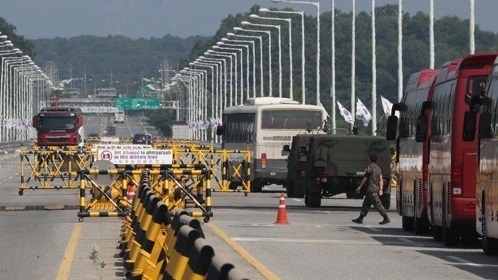Police are reviewing whether to seek an arrest warrant against a South Korean man caught attempting to cross the inter-Korean border to defect to the North.
According to the Gyeonggi Bukbu Provincial Police Agency, they are investigating a 34-year-old man surnamed Suh, who was arrested early on Sunday after he was found attempting to cross the border near the Unification Bridge, located in Paju, Gyeonggi Province.
 |
Unification Bridge in Paju, Gyeonggi Province, South Korea (Yonhap) |
It is his second known attempt to enter North Korea. On July 22, Suh was caught trying to illegally enter the North via China. He was detained in North Korea for 16 days and repatriated through Panmunjom on Aug. 7.
Suh reportedly drove an SUV to the checkpoint on the South Korean side of the Unification Bridge located in Paju, Gyeonggi Province, without undergoing inspection. He was found to be attempting to cross the checkpoint, which leads to the Demilitarized Zone separating the two Koreas.
He was stopped by South Korean troops stationed at the joint security area of Panmunjom at a nearby reservoir located 6 kilometers from the bridge. The vehicle’s tires were punctured as he drove through a barricade with metal spikes installed at the North Korean side of the bridge.
Police said Suh has a driver’s license and was sober at the time he attempted to cross the border.
“There is a possibility that he has a mental problem, but we have not yet found his medical records. He is refusing to testify on his motives, except for admitting to the fact that he attempted to defect to the North,” the police said.
This is Suh’s second known attempt to enter North Korea. Police reports say Suh was detained by North Korean authorities for 16 days after illegally entering the North via China last month.
Police refused to reveal whether the government had conducted an investigation of Suh after he was repatriated to the South.
Korean nationals are prohibited from going to North Korea without government permission. If they enter the North illegally, they are subject to up to 10 years in prison for violating Article 6 of the National Security Act.
By Jo He-rim (
herim@heraldcorp.com)





![[KH Explains] For Korean automakers, Chinese EVs may loom larger than Trump’s tariffs](http://res.heraldm.com/phpwas/restmb_idxmake.php?idx=644&simg=/content/image/2024/11/14/20241114050537_0.jpg)
![[Graphic News] Tainan predicted top destination for South Koreans in 2025](http://res.heraldm.com/phpwas/restmb_idxmake.php?idx=644&simg=/content/image/2024/11/13/20241113050807_0.gif)

![[Herald Review] Cho Seung-woo takes 'Hamlet' crown](http://res.heraldm.com/phpwas/restmb_idxmake.php?idx=644&simg=/content/image/2024/11/14/20241114050593_0.jpg)